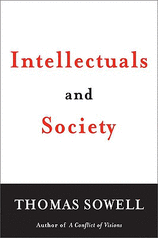|
|
|
In his latest book, Thomas Sowell examines the general mindset and tendencies of contemporary intelligentsia, along with the often-detrimental results of their influence on public policy and society. He defines intellectuals as "people whose occupations deal primarily with ideas – writers, academics, and the like," and whose final products are not subject to the everyday accountability faced by engineers, brain surgeons and scientists. Nonetheless, ideas have feet, and more people are being stepped on as intellectuals’ visions of the world are disseminated more widely than ever through journalists, teachers, legislative staffers and law clerks. Ever the economist, Sowell frames his analysis in terms of the "incentives and constraints" common to elites. Sowell makes his case with wide-ranging examples from criminology, economics, law, and foreign policy. He is ruthless in his use of empirical data to refute pet notions of intellectuals, and he takes them to task for scorning the knowledge and experience of those they presume to rule over: "Intellectuals have, on issues ranging across the spectrum from housing policies to laws governing organ transplants, sought to have decision-making discretion taken from those directly involved, who have personal knowledge and a personal stake, and transferred to third parties who have neither, and who pay no price for being wrong." For example, "Many of the intelligentsia express not only surprise but outrage at the number of shots fired by the police in some confrontation with a criminal, even if many of these intellectuals have never fired a gun in their lives, much less faced life-and-death dangers requiring split-second decisions." In fact, the New York City Police Department found that police under stress have quite a low firing accuracy, with only 14% of shots hitting targets between 16 to 25 yards away, less than the distance from first base to second base. Some of the book is a distillation of Sowell's previous works, including A Conflict of Visions and Basic Economics (though with updated statistics). But the reiterated concepts aren’t just space-fillers; they are integral supports to the basic premise of the book. Those who have read Sowell’s other books will still find plenty of new material to ponder and contemplate. To those who protest that Sowell himself is an intellectual, the author concedes the point. "But because my ideas disagree with those of so many other people, they are constantly trying to disprove them," he told interviewer Dennis Prager. "Or at least they used to; in more recent times they simply keep quiet…and proceed as if I hadn’t said anything." (Basic Books, 2009, 398 pp., $30) |
 Intellectuals often offer "solutions" to social "problems," or "raise the alarm about some dire dangers which they claim to have discovered," in search of significance, public acclaim and wealth beyond levels attainable in their area of genuine competence. They also believe their specialized expertise renders them mentally and morally qualified to prescribe unrelated social policies for others with more mundane (yet often more consequential) knowledge. Furthermore, intellectuals rarely lose jobs or suffer loss of reputation for even their most outrageous and empirically false positions, as long as they promulgate the worldview of their similarly insulated peers.
Intellectuals often offer "solutions" to social "problems," or "raise the alarm about some dire dangers which they claim to have discovered," in search of significance, public acclaim and wealth beyond levels attainable in their area of genuine competence. They also believe their specialized expertise renders them mentally and morally qualified to prescribe unrelated social policies for others with more mundane (yet often more consequential) knowledge. Furthermore, intellectuals rarely lose jobs or suffer loss of reputation for even their most outrageous and empirically false positions, as long as they promulgate the worldview of their similarly insulated peers.

